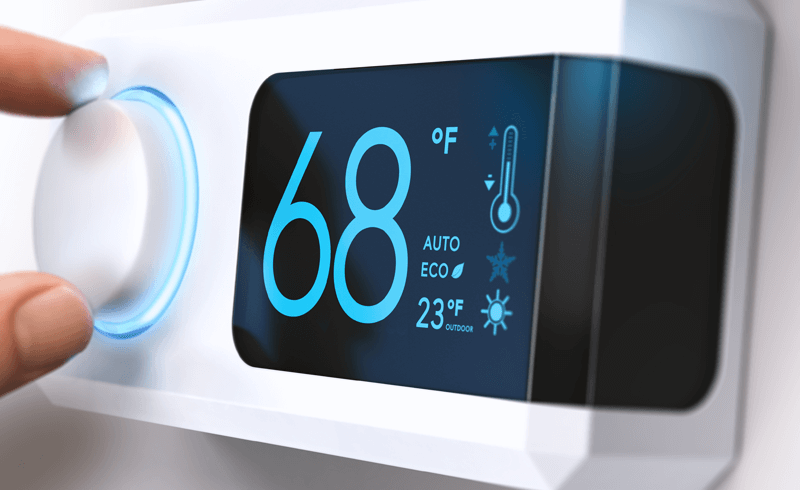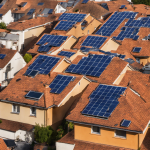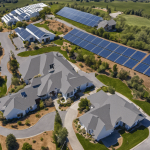
New Technology Drives Energy Efficiency
The home energy retrofit market is experiencing a boom thanks to innovative technologies and increasing awareness of the importance of energy efficiency. A recent article on Forbes highlights the growth of this market and the role it plays in job creation and environmental sustainability. As homeowners look for ways to save money on utility bills and reduce their carbon footprint, the demand for energy-saving smart home gadgets and energy-efficient construction methods is rising.
Smart Home Gadgets and Energy Management
A CNET article showcases the best energy-saving smart home gadgets currently available. These devices can help homeowners monitor and control their energy consumption, reducing utility bills and carbon emissions. HiddenWires also delves into the benefits of energy management systems, which can help homeowners optimize their energy usage and ensure their homes are as energy-efficient as possible.
Eco-Friendly and Sustainable Custom Homes
As the trend toward green living grows, more people want to build custom, eco-friendly homes. Intelligent Living highlights the benefits of constructing sustainable custom homes, which often incorporate energy-efficient technologies and environmentally friendly materials. These homes reduce their impact on the environment and provide long-term cost savings for homeowners.
Innovative Home Electrification Technology
One company making strides in the home energy retrofit market is Span, which recently raised $96 million to accelerate product innovation for its award-winning home electrification technology, as reported by the Eagle Tribune. Span's smart electrical panel allows for the easy integration of solar energy, energy storage, and electric vehicle charging systems into existing homes, supporting the transition to a more sustainable and energy-efficient future.
As the home energy retrofit market continues to expand, it's clear that adopting energy-efficient technologies and practices has far-reaching implications for individual homeowners, the economy, and the environment. With the continued growth of this sector, we can expect to see even more innovative solutions for greening our homes and making them more energy-efficient in the coming years. This progress will likely be driven by advances in renewable energy systems, smart home technology, and sustainable building materials that align with ecofriendly home design trends. These trends emphasize the importance of integrating aesthetics with functionality, ensuring that homes are not only efficient but also visually appealing. By embracing these innovations, homeowners can reduce their carbon footprint while enjoying long-term cost savings.
Embracing Solar Energy for Home Use
Solar energy is a key component of the push toward more energy-efficient homes, as it offers a renewable and abundant source of power. The integration of solar panels into home energy retrofit projects not only helps to reduce homeowners' reliance on fossil fuels but also contributes to a cleaner and more sustainable energy grid. As the cost of solar panels continues to decrease, more homeowners are likely to embrace this form of clean energy as part of their energy-efficient home improvements.
Government Incentives and Programs Supporting Energy Efficiency
Various government incentives and programs have been put in place to further encourage the adoption of energy-efficient technologies and practices. These initiatives, such as tax credits and rebates, help to reduce the upfront costs of energy-efficient upgrades and make them more accessible to a broader range of homeowners. As more people become aware of the benefits of energy-efficient homes and the financial incentives available, the demand for home energy retrofits and green technology is expected to grow.
In conclusion, the rise of energy-efficient technology and its impact on the economy are significant, creating new job opportunities and promoting a more sustainable future. With continued innovation and support from government incentives, we can anticipate further advancements in energy efficiency and a lasting positive effect on the environment and homeowners' wallets.
DIY Tips For Home Owners
- DIY Solar Water Heater: Homeowners can create their solar water heater using readily available materials such as PVC pipes, a water storage tank, and a solar collector. This project helps reduce energy consumption and save money on water heating bills while using the sun's free energy.
- DIY Energy-Efficient Window Treatments: Homeowners can create energy-efficient window treatments to help regulate indoor temperatures and reduce energy consumption. This can be done by sewing or attaching insulating materials, such as thermal or blackout liners, to existing curtains or blinds. Alternatively, they can create draft stoppers for windows and doors to prevent cold air from entering the home.
- DIY Home Energy Audit: Homeowners can conduct their home energy audit to identify areas where energy is wasted and make improvements accordingly. This may involve checking for drafts around windows and doors, inspecting insulation in walls and attics, and evaluating the efficiency of appliances and heating/cooling systems. By identifying and addressing these energy inefficiencies, homeowners can save money on utility bills and contribute to a more sustainable living environment.
In conclusion, homeowners have many opportunities to take control of their home's energy consumption and contribute to a more sustainable future. By exploring these DIY projects and investing time and effort in energy-saving upgrades, you will see the benefits in your utility bills and be doing your part to protect our planet. It's up to us to make a difference, and there's no better place to start than within our own homes. So why not roll up your sleeves, gather your tools, and embark on a journey to create a more energy-efficient and eco-friendly living space for you and your family?

James Smith is our editor. He is an accomplished and versatile news writer with over a decade of experience covering a wide range of topics, including politics, business, and real estate. Throughout his career, James has been dedicated to uncovering the truth and presenting unbiased, factual reporting to his audience.















